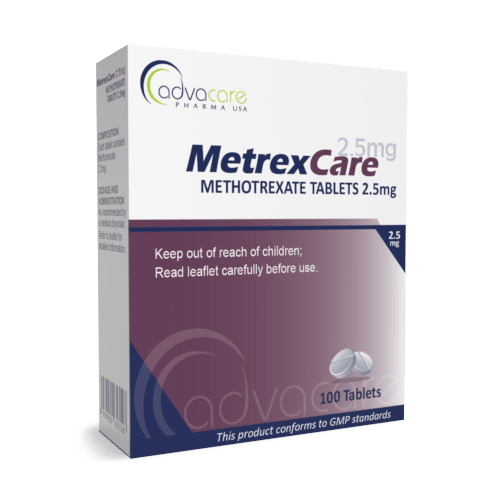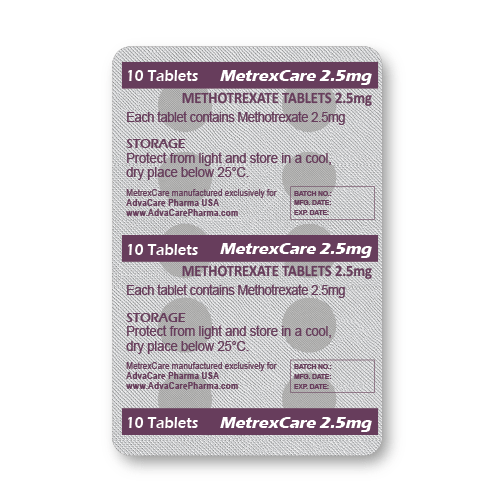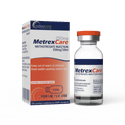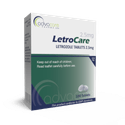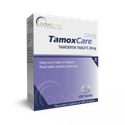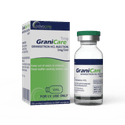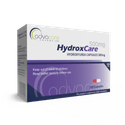- Home›
- Pharmaceuticals›
- Oncology Products›
- Oncology Tablets›
- Methotrexate Tablets
Methotrexate Tablets
Dosage
Packaging
What is Methotrexate?
Active Ingredients: Methotrexate
Methotrexate Tablets are used to treat leukemia and some types of cancer. It may also be prescribed for autoimmune diseases like severe psoriasis and rheumatoid arthritis. Methotrexate is also indicated for the treatment of active polyarticular-course juvenile rheumatoid arthritis in children over 2 years old.
Methotrexate is classified as an antimetabolite and antifolate, which works by interfering with the growth of certain cells of the body. It is particularly effective against cells that reproduce quickly, such as cancer, bone marrow, and skin cells. The active ingredient is also an immunosuppressant and therefore works to treat rheumatoid arthritis by decreasing immune system activity.
Methotrexate's mechanism of action in cancer therapy is primarily through its ability to inhibit dihydrofolate reductase, an enzyme crucial for DNA synthesis. By blocking this enzyme, Methotrexate hampers the ability of rapidly dividing cells, such as those in tumors, to replicate.
This inhibition is particularly effective in treating cancers like leukemia, where the rapid proliferation of abnormal white blood cells is a key characteristic. Methotrexate is also used in certain chemotherapy regimens due to its ability to enhance the efficacy of other chemotherapeutic agents, a concept known as chemosensitization.
Methotrexate's role as an immunosuppressant is central to its effectiveness. By dampening the overactive immune response, particularly in conditions like rheumatoid arthritis and severe psoriasis, it reduces inflammation and slows down the process of joint damage and skin cell overproduction.
In pediatric rheumatology, particularly for polyarticular-course juvenile rheumatoid arthritis, its use is based on reducing joint inflammation and preserving joint function. Its use in children requires careful dosage adjustment and monitoring, considering their developing bodies and potential long-term effects. Regular blood tests to monitor liver function, complete blood count, and kidney function are essential to avoid potential toxicity.
AdvaCare Pharma is a trusted global supplier of Methotrexate Tablets. Our company offers a wide range of high-quality and cost-effective medical products for distribution. Our factories are GMP-certified and regularly inspected to ensure they meet the high standards necessary to comply with WHO guidelines and standards.
Why are we a trusted Methotrexate manufacturer?
AdvaCare Pharma manufactures Methotrexate Tablets, one of 40+ oncology treatments, according to rigorous GMP protocols at our state-of-the-art production facility. We are committed to producing quality-assured, cost-effective cancer treatments that meet the highest industry standards and are readily available to cancer patients worldwide. As an established Methotrexate manufacturer, we supply pharmaceutical distributors, hospitals and government institutions with reliable cancer drugs.
Uses
What is Methotrexate used for?
It is used to treat leukemia and some types of cancer of the breast, bones, skin, head, neck, or lungs. It is also used to treat rheumatoid arthritis or severe psoriasis. It is also used to treat idiopathic arthritis in children over 2 years old.
How are Methotrexate Tablets used?
This medication is manufactured to be taken orally.
What dose should be taken?
Recommended dosage guidelines may vary depending on medical condition:
- The usual starting dose is 20mg/m², taken once a week.
- As monotherapy for mycosis fungoides, the usual dose is 25-75mg, taken once per week. As a combination treatment, the dose is 10mg/m², taken twice per week.
- For relapsed or refractory non-Hodgkin lymphoma, the usual dose is 2.5mg, taken 2-4 times per week as part of a multidrug chemotherapy treatment plan.
- For rheumatoid arthritis or severe psoriasis, the usual dose is 7.5-25mg, taken once per week. Treatment is typically combined with folic acid or leucovorin.
- For juvenile idiopathic arthritis in pediatric patients over 2 years old, the usual dose is 10-15mg/m², taken once per week. The maximum dosage is 25mg per week.
Refer to a doctor or pharmacist for guidelines on dosage.
Is Methotrexate suitable for all age groups?
While Methotrexate can be used in both adults and children, its use in very young children, particularly those under 2 years old, is typically avoided due to the potential for severe side effects. In elderly patients, the drug may require dosage adjustments and close monitoring due to age-related changes in liver and kidney function.
Is Methotrexate a steroid medication?
Methotrexate is not a steroid; it is an antimetabolite and antifolate drug. While steroids are also used in the treatment of certain cancers and autoimmune diseases, their mechanism of action and side effect profiles differ significantly from it.
Is Methotrexate effective in treating all stages of cancer?
Its effectiveness can vary depending on the type and stage of cancer. It is often more effective in earlier stages and specific type, particularly those that involve rapidly dividing cells. Its use in advanced cancer stages is typically part of palliative care to manage symptoms and improve quality of life.
Can Methotrexate be combined with other cancer treatments?
It is often used in combination with other chemotherapy agents as part of a multidrug regimen. This approach can enhance the overall effectiveness of treatment and target cancer cells through different mechanisms. The specific combination and dosage depend on the type and stage of cancer being addressed.
How does Methotrexate work in treating autoimmune diseases?
In autoimmune diseases like rheumatoid arthritis and psoriasis, Methotrexate helps by suppressing the overactive immune system. This reduces inflammation and slows the progression of the disease, alleviating symptoms and preventing joint damage or skin manifestations.
How does Methotrexate affect the immune system?
Methotrexate exerts immunosuppressive effects by inhibiting the activity of certain immune cells involved in the inflammatory process. This is beneficial in autoimmune illnesses where the immune system mistakenly attacks the body's own tissues.
What is the role of Methotrexate in bone marrow suppression?
One of the side effects of Methotrexate is bone marrow suppression, which can lead to reduced production of blood cells. This is relevant in high doses or prolonged therapy, necessitating regular monitoring of blood cell counts.
Can Methotrexate be used as a maintenance therapy?
In some cases, particularly in certain types of cancer and chronic autoimmune conditions, it can be used as maintenance therapy. This involves lower doses administered over a longer period to help keep the disease in remission and prevent relapse.
Can Methotrexate be used in transplant patients?
While Methotrexate has immunosuppressive properties, its use in transplant patients as an anti-rejection medication is not common.
Can Methotrexate be used in patients with liver disease?
This drug is metabolized in the liver and can be hepatotoxic, so its use in patients with pre-existing liver disease or significant liver function impairment is generally contraindicated. Regular liver function tests will be required.
How does Methotrexate interact with the body's folate metabolism?
Methotrexate is an antifolate drug, which means it inhibits the action of folic acid in the body, a vitamin essential for DNA synthesis. By blocking folate metabolism, it interferes with the growth of rapidly dividing cells, such as cancerous cells and inflammatory cells in autoimmune diseases.
Is Methotrexate a first-line treatment for rheumatoid arthritis?
Methotrexate is often considered a first-line treatment for rheumatoid arthritis due to its effectiveness in reducing symptoms and slowing disease progression. It is usually one of the first medications prescribed when disease-modifying antirheumatic drugs (DMARDs) are indicated.
How does Methotrexate assist in the management of psoriatic arthritis?
In psoriatic arthritis, it helps control both skin lesions and joint inflammation. It acts by reducing the excessive production of skin cells and modulating the immune response that contributes to joint inflammation and damage.
Can lifestyle factors affect the effectiveness of Methotrexate treatment?
Yes, they can. Alcohol consumption should be limited or avoided, as it can increase the risk of liver toxicity associated with Methotrexate. A well-balanced diet is also important, but patients should be mindful of excessive consumption of foods high in folic acid. Patients are also advised to avoid excessive sun exposure, as Methotrexate can make the skin more sensitive to sunlight.
Side Effects
As with all pharmaceuticals, some unwanted effects can occur from the use of Methotrexate Tablets.
Some common side effects include, but may not be limited to:
- blood in the urine
- bloody vomit
- reddening of the skin
- stomach pain
- sores in the mouth or lips
Seek medical attention if the following develop:
- diarrhea
- ulcerative stomatitis
For a comprehensive list of all possible effects, consult a doctor.
If any symptoms persist or worsen, or you notice any other symptoms, please call your doctor immediately.
Precautions
Do NOT use Methotrexate Tablets if:
- You are allergic or hypersensitive to any of the ingredients.
- You are pregnant or breastfeeding.
- You have rheumatoid arthritis with alcoholism, alcoholic liver disease, or any chronic liver disease.
This medication may not be suitable for people with certain conditions, including:
- kidney disease
- breathing problems
- stomach ulcer
- ulcerative colitis
- any infection
- any radiation treatment
Do not use Methotrexate to treat arthritis during pregnancy, as it can cause fetal death. The use of Methotrexate while breastfeeding can cause adverse reactions in babies. Consult a doctor or healthcare professional before beginning treatment.
It is possible for Methotrexate to affect fertility in both female and male patients. It is important to use birth control during treatment with this drug.
Many drugs are known to interact with Methotrexate, including antibiotics, sulfa drugs, folic acid, theophylline, or stomach acid reducers.
Methotrexate's interactions extend to other medications such as nonsteroidal anti-inflammatory drugs (NSAIDs), certain immunizations or vaccines, and various cancer chemotherapies. NSAIDs, commonly used for pain and inflammation, can increase the toxicity of Methotrexate, especially on the kidneys.
Vaccinations using live vaccines should be avoided during Methotrexate treatment due to the immunosuppressive effects of the drug, which can lead to reduced vaccine efficacy and increased risk of infection. In cancer chemotherapy, it can either potentiate or be antagonized by other chemotherapeutic agents.
Methotrexate 10mg: Why the most common dose?
Methotrexate 10mg is commonly used because it provides a balance of efficacy and safety. Initial doses may include Methotrexate 7.5mg or Methotrexate 15mg, while lower doses like Methotrexate 5mg or Methotrexate 2.5mg are often used for maintenance or to minimize side effects.
References
Breast cancer: insights in disease and influence of drug methotrexate
Cancer is one the leading cause of morbidity and mortality worldwide and among women, breast cancer is the most common one. Chemotherapy has a narrow therapeutic window, depending upon the specific type of cancer, the drug being used, and the individual patient and requires high dosages of treatment.
Methotrexate is not a first-line drug used against breast cancer, but it can be used in cases of breast cancer. It is an effective and cheap drug that might impair malignant growth without irreversible damage to normal tissues.
The conclusion is that methotrexate can be very efficacious in cases of breast cancer.

You might be interested in...
Why AdvaCare Pharma?
As an industry leader, we are aware of our responsibility to provide affordable and sustainable solutions to improve healthcare worldwide.
